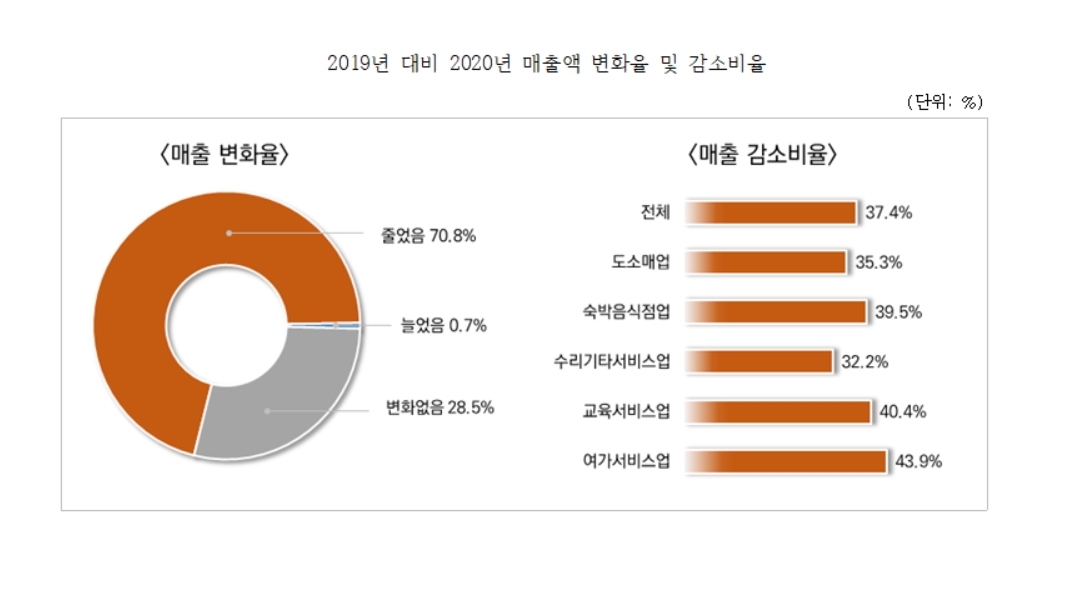Small Business Association Survey… “Psychological stress such as anxiety and depression is also severe”

Seven out of 10 small business owners reported a decrease in sales this year due to the Corona 19 incident, and an average of 37% decrease in sales.
The fixed cost, which was the most burdensome economically, was rent.
The Federation of Small Businessmen announced on the 27th that this appeared in the’Survey on the Impact of Small Businessmen Related to Corona 19′, which was conducted on 1,018 small businessmen from October 19th to November 5th by requesting a polling company Beyond Research.
As a result of the survey, 70.8% of respondents said that this year’s sales declined from last year, and only 0.7% said that their sales increased. 28.5% answered no change. The average rate of decrease in sales of small business owners who said their sales declined was 37.4%.
By industry, the leisure service industry showed the highest decrease in sales with 43.9%, followed by education service industry (40.4%), lodging and restaurant (39.5%), and wholesale and retail (35.3%).
Prior to Corona 19, 45.3% of the time required to recover sales or sales level was the most. This was followed by more than 2 to less than 3 years (23.0%), more than 3 years (17.2%), and more than 6 months to less than 12 months (12.0%).
As the most economically burdensome fixed cost (multiple responses), rent (68.8%) was cited the most. After that, labor costs (54.1%), various taxes (50.6%), and loan interest (14.8%) were followed.
The amount supported by various policies was mainly used for rent (47.3%), followed by labor expenses (19.1%), personal living expenses (13.5%), raw materials or parts purchase (9.6%), and various taxes (9.0%). And so on.
Regarding the level of support, the opinion that the level of support for Corona 19, the current small business is insufficient, was the most common at 53.5%.
Of these, 45.9% answered that the support was insufficient, and said that it was not a fundamental solution, but’temporary support’, and 39.3% said that the support fund was less than the demand.
As for the policies (multiple responses) necessary for small business owners in the future, they cited loans for emergency management stabilization funds for small business owners (56.5%), rent support (51.2%), direct and indirect tax tax benefits and reductions (47.0%).
As a result of confirming the degree of anxiety of small business owners using a psychological measurement tool, 17.1% of the respondents were found to fall under the’anxiety risk group’. This rate is higher than that of the general population (15.0%).
The `depression risk group` based on the depression measurement tool was 20.2%, which was also higher than that of the general population (18.6%).
Regarding whether Corona 19 has affected their daily lives, 95.6% of respondents said yes, which is far higher than 27.3% of respondents that Middle East Respiratory Syndrome (MERS) affected their daily lives.
So Gong-yeon explained that the degree of disruption in daily life due to Corona 19 is 4.50 points out of 5 points, which is 1.33 times that of the Sewol ferry disaster and 1.54 times that of the MERS outbreak.
Kim Im-yong, acting chairman of the Federation of Small Business Owners, said, “As small business owners have a large rent burden, measures for emergency assistance for small business owners, such as direct rental support plans and a large expansion of emergency loans, must be implemented quickly.”
Copyrightⓒ Korea Economic Daily TV. All Rights Reserved. Unauthorized reproduction and redistribution prohibited
